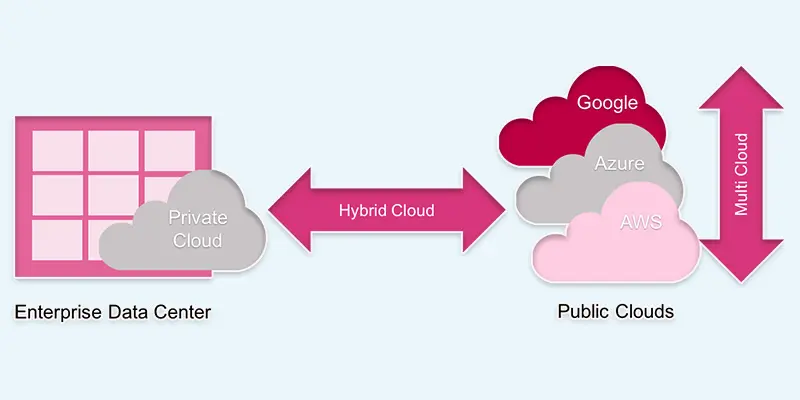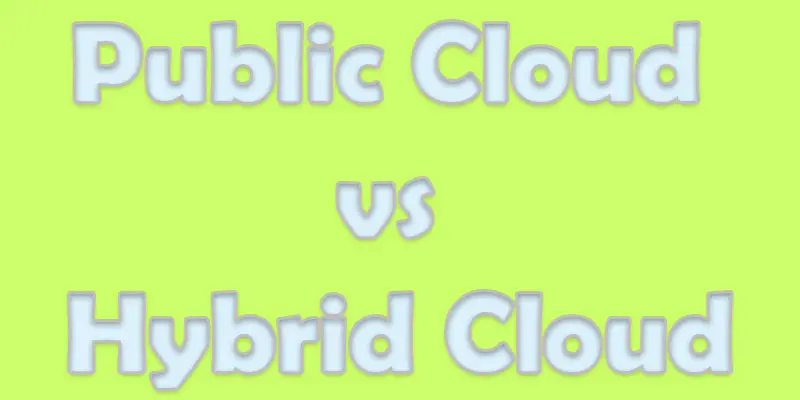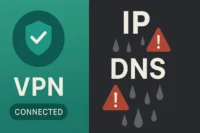Hybrid Cloud vs Public Cloud | Key Differences Explained
Published: 23 May 2025
Public Cloud vs Hybrid Cloud for Small Businesses
Many businesses today are switching to cloud solutions, but understanding hybrid cloud vs public cloud is key to making the right choice. Are you confused about which one fits your needs best? Choosing between a hybrid cloud vs public cloud can feel tough, especially when you need strong security, low costs, and easy growth. Whether you run a small startup or a big company, picking the right setup can help you grow smarter.
What is a Public Cloud?
A Public Cloud is a service where resources like storage and servers are shared over the internet. Anyone can use it by paying for what they need. It’s affordable and easy to use for businesses of all sizes.
What is Hybrid Cloud Model?
A combination of private and public cloud services is called a Hybrid cloud architecture. It lets you store some data in a secure private cloud and run other tasks in a public cloud. This gives businesses more flexibility and control.

Difference Between Hybrid Cloud and Public Cloud
How you store and manage your data distinguishes a hybrid cloud from a public cloud the former employs both private and public places, while the latter is entirely public.
| Hybrid Cloud | Public Cloud |
|---|---|
| With less control, the provider manages it. | Fully public systems only. |
| A mix of private and public systems. | Less control, the provider manages it. |
| More control over data and apps. | Higher setup and maintenance costs. |
| Very flexible, can move data easily. | Flexible, but limited to provider rules. |
| Stronger security for sensitive data. | Good security but shared with others. |
| Highly customizable. | Limited customization. |
| Slower to set up. | Fast to set up. |
| Needs an IT team to manage. | Good performance, depending on the provider. |
| Private and public storage options. | Public storage only. |
| Easy to scale based on needs. | Very easy and fast to scale. |
| High performance for critical apps. | Built-in backup by the provider. |
| Better for meeting legal requirements. | May need extra work for compliance. |
| Depends fully on the provider’s uptime. | The provider handles almost everything. |
| The business handles private parts. | Shared resources with others. |
| Manual for private, automatic for the public. | Depends fully on the provider’s uptime. |
| Lower if the private part is strong. | Automatic updates by a provider. |
| Manual for private, automatic for public. | Businesses need quick, low-cost cloud. |
| Slower because of private systems. | Faster with new cloud features. |
| Lower upfront and running costs. | Startups, small businesses, apps. |
| Businesses need security + flexibility. | Businesses need a quick, low-cost cloud. |
How to Choose Between Public Cloud and Hybrid Cloud?
Choosing between Public Cloud and Hybrid Cloud depends on your business needs, budget, and how much control you want over your data.
Choose Public Cloud if:
- You have a small business or startup with a tight budget.
- You need quick deployment and easy access to resources.
- Your data is not highly sensitive or regulated.
- You want a pay-as-you-go pricing model to save costs.
- You need global scalability without managing infrastructure.
Choose Hybrid Cloud if:
- Your business handles sensitive or confidential data.
- You must follow strict compliance and security regulations.
- You want to keep critical workloads on-premise and non-critical ones in the cloud.
- You need flexibility to balance costs and control.
- Your organization is large with complex IT needs.
- You plan to grow and need a mix of public and private environments.

Conclusion About Public Cloud vs Hybrid Cloud Comparison for Enterprises
Public cloud vs hybrid cloud performance is a critical decision for businesses today. In my opinion, if you need flexibility and greater control over your data while maintaining some level of public cloud resources, the hybrid cloud approach might be your best bet. It offers a balanced solution that suits various business needs, especially for those requiring both private and public cloud benefits. I recommend evaluating your company’s specific requirements and resources before making a decision. To keep ahead in the rapidly evolving digital world of today, act now and begin developing your cloud strategy.
FAQS
AWS (Amazon Web Services) is a public cloud. It offers cloud services that are accessible to anyone and managed by AWS.
Blended, a hybrid cloud integrates both private and public clouds. One of its components, the public cloud, provides scale resources.
Netflix operates its services on both private and public clouds. While it maintains certain own infrastructure for certain purposes, the majority of its operations are dependent on AWS (public cloud).
An example of a hybrid cloud is a business using a private cloud for sensitive data and a public cloud like AWS for general computing tasks.
Azure offers hybrid cloud services. It allows businesses to integrate both on-premises and cloud resources, making it a flexible hybrid cloud solution.
AWS Lambda functions are small, serverless pieces of code that automatically run in response to events, allowing you to execute code without managing servers.

- Be Respectful
- Stay Relevant
- Stay Positive
- True Feedback
- Encourage Discussion
- Avoid Spamming
- No Fake News
- Don't Copy-Paste
- No Personal Attacks



- Be Respectful
- Stay Relevant
- Stay Positive
- True Feedback
- Encourage Discussion
- Avoid Spamming
- No Fake News
- Don't Copy-Paste
- No Personal Attacks





